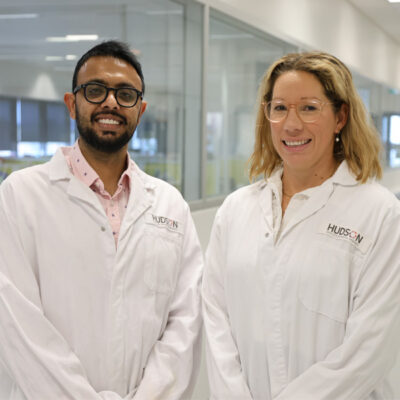The benefits of creatine: a safer birth for mum and baby
By Rob Clancy, staff writer. Reviewed by Dr Stacey Ellery

The benefits of creatine are well known for helping with muscle performance, and now attention has turned to whether it can help mothers and babies have a safer birth.
Restricted oxygen delivery to the baby at birth can have severe, long-term impacts including organ damage, developmental delay, cerebral palsy, autism, neurological and mental health disorders, seizures, behavioural issues, ADHD or hearing impairment.
This latest research from a team led by Dr Stacey Ellery and Dr Nhi Tran at Hudson Institute of Medical Research, and published in the journal Frontiers in Cellular Neuroscience, tested dietary creatine as a supplement during pregnancy to prevent these problems.
Creatine benefits energy production
Dr Ellery, who chose to use creatine during her own pregnancy, said there is growing evidence that creatine may be essential for energy production in many facets of conception and maternal health, as well as for the growing and developing baby.
“Creatine is the fuel for the ‘backup energy battery’ of many vital cells in the brain, so we have been studying its use in cases of energy failure in the fetal brain when oxygen levels drop, and whether this simple supplement can prevent injury.” she said.
“The theory is that by providing more charge for this battery through dietary supplements, cells have a greater capacity to maintain energy turnover when oxygen levels drop. This ultimately reduces the build-up of nasty by-products, including reactive oxygen species and inflammatory molecules, reducing cell death and maintaining brain health.”
This is the most comprehensive assessment of the health of multiple cell populations, across several key regions of the fetal brain, following long-term exposure to high creatine in utero and birth asphyxia.
Protective benefits of creatine
And the results suggest that there are protective benefits of creatine to be had, though more research is required.
“Together with the extensive data already produced by our group, it provides evidence to support a clinical trial of dietary creatine in pregnancy, something we are working towards undertaking in the next two-three years once pre-clinical studies and provisional work to ensure an effective dose and safety are finalised,” Dr Ellery said.
“Much like the introduction of folate to reduce neural tube deficits, creatine could become a standard pregnancy supplement to safeguard against poor neurological outcomes in babies. Importantly, this is a treatment that could be accessible for all babies, regardless of their geography or economic circumstances.”
Collaborators | Monash University, RMIT University, Deakin University
This research was supported by | NHMRC
Journal | https://pubmed.ncbi.nlm.nih.gov/37066075/
Title | Creatine in the fetal brain: A regional investigation of acute global hypoxia and creatine supplementation in a translational fetal sheep model
View publication | https://doi.org/10.3389/fncel.2023.1154772
In this article
About Hudson Institute
Hudson Institute’ s research programs deliver in three areas of medical need – inflammation, cancer, women’s and newborn health. More
Hudson News
Get the inside view on discoveries and patient stories
“Thank you Hudson Institute researchers. Your work brings such hope to all women with ovarian cancer knowing that potentially women in the future won't have to go through what we have!”






